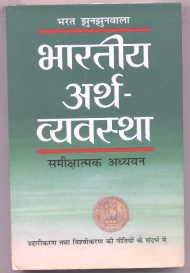|
Sen says that it is the moral responsibility of the rich countries to redistribute a part of their wealth to the poorer ones. But he argues for a permanent policy of redistribution as a right. In doing so he endorses that the rich of today will continue to be the rich of tomorrow.
When people demand redistribution from the rich as a right then they accept the fact that they are deprived. This mental outlook hits at their self-esteem and own efforts to improve their situation.
The developing countries have two routes open to them. Either they can try to acquire frontier technologies and strive to become 'equal' to the rich countries--relying on this historical process of spread of technology. Or they can accept their superiority to be permanent and seek redistribution. Sen's focus on redistribution hits at the natural tendency towards equality which arises from the spread of technologies.
Every human being should have the access to health and education. But there are two routes to get to this goal. One is to provide the people with a 'Right to Work' and let them acquire health and education from the market. The second approach is that of welfare state. This leads to the development of a 'recipient' mentality among the deprived. The money spent on the provision of health and education cuts and equal amount from infrastructure and 'Right to Work'. The result is a healthy and educated work force which has less opportunities for work.
Sen's idea of unlimited expansion of freedom does not hold. There has to exist another objective on the basis of which one can decide how much and in which direction to expand his freedom. Sen fails to provide any such 'higher' objective on the touchstone of which the quantum of freedom that is desirable can be determined.
The Sanatana tradition suggests 'opportunity of self-realization' as such an overarching objective. Mere expansion of such freedom is counterproductive because it may distract from the objective of self-realization.
Foreign investment leads to short run growth by providing more capital. But it hits at the long term reinvestment and growth of the developing countries; because the law of diminishing returns leads to lower profits on domestic capital which constitutes of the long run investment pie.
Foreign trade is basically beneficial. The problem arises from the uncertainties in the world economy. There is an 'optimum' level which balances the current benefits from foreign trade against the potential losses from an unstable world economy.
Membership of the WTO involves costs via the Patents regime and benefits via MFN treatment. On the balance it is beneficial as it stands today. Once the investment regime is added-on, the negative aspects become much stronger and it would be wiser for India to quit the WTO altogether.
|  |
|

The book is written in hindi. It was initially written in english by my dad and I decided to rewrite it in hindi, changing the perspective of the reader from English to hindi. It took me a year's hard work to complete this project.
Anyways, I was not given the co-authorship of the book, as initially decided...all thanks to the publisher who thought I was rather too young and inexperienced to be writing a book on Indian Economy! Bur as I say....its only the begining and i know I have a long way to go, so nevermind...life moves on and so do I!
|
|